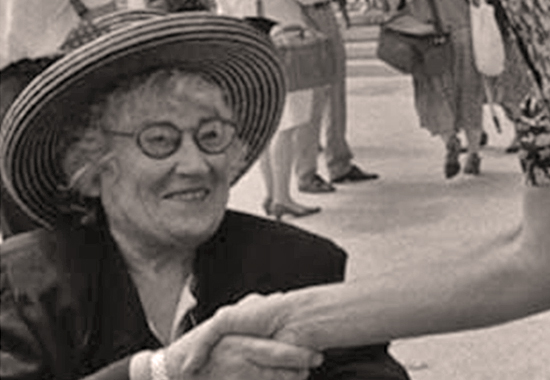|

BELLA BRIOSITÀ, BELLA ABZUG -
BEIJING, 1995
Women Will Not Stop
Go here for more about
 Bella Abzug.
Bella Abzug.
Go here for more about
 Bella Abzug's Women Will Not Stop
speech.
Bella Abzug's Women Will Not Stop
speech.
It follows an excerpt text transcript of
Bella Abzug's Women Will Not Stop speech, delivered at
Beijing, China - September 12, 1995.

 |
What will we
accomplish at the week's end when the Platform
for Action is adopted by the world's women and
its 187 governments? |
We are building a
consensus to face life's realities. The
affirmation of women's sexual rights is an
important and bold step forward.
We are creating a better environment,
attributing the cause of environmental
degradation to unsustainable over-consumption
and production and military conflict.
We are affirming human rights for all women and
girls, acknowledging the full range of diversity
that exists and detailing actions to prevent
violence.
We are generating better opportunities for women
who are living at the margins of life, women who
are the majority of the world's poor, hungry and
illiterate. Women who would transform the lives
of themselves and their families with just a
five percent slice of the military pie. That
would be a banquet for the world's 1.3 billion
poor.
We are strengthening all families by supporting
their economic and social needs. We are
fashioning new ways to involve women at all
stages of negotiation and decision-making. From
kitchen tables to peace tables women propose to
turn the tables on the status quo.
We are challenging all corporations to play by
the rules and all governments to ensure that the
rules are fair. We are moving a political,
social and economic agenda for equality and
democracy. Democracy within homes, markets and
the state. From Beijing, the world will never be
the same.
Beijing has given birth to a global movement for
democracy that as Gertrude Mongella said in her
opening statement in the Great Hall of the
People, is a "revolution."
New partnerships
between men and women based on real equality.
Imperfect though it may be, the Beijing Platform
for Action is the strongest statement of
consensus on women's equality, empowerment and
justice ever produced by governments. The
Beijing Platform is a consolidation of the
previous UN conference agreements in the unique
context of seeing it through women's eyes.
It is an agenda for change, fueled by the
momentum of civil society, based on a
transformational vision of a better world for
all.
We are bringing women into politics to change
the nature of politics, to change the vision, to
change the institutions. Women are not wedded to
the policies of the past. We didn't craft them.
They didn't let us.
As women, we know that we must always find ways
to change the process because the present
institutions want to hold on to power and keep
the status quo. Just five short years ago, we
developed the Women's Caucus methodology to
influence the global agenda at the UN for the
Earth Summit. WEDO and countless other NGOs have
carried this work forward, linking the gains
made at each conference, trying to prevent
collective amnesia by governments.
Now as we leave Beijing, women will not stop.
It's like jet
propulsion. The fact that so many women made
such an effort to participate in this historic
conference is a testament to the seriousness of
the agenda. Now, women around the world own this
agenda. Women will ensure that others know about
the provisions agreed to and the commitments
made and millions will press their governments
to follow through.
One year after the Cairo conference, the Earth
Summit Watch (initiated by the National
Resources Defense Council, WEDO and other NGOs)
presented Nafiz Sadik, the head of UNFPA with a
one year progress report on how governments are
doing in their implementation of the ICPD
Programme of Action. The results of the first
global survey revealed that only one-third of
governments bothered to reply. But 46 of the 54
countries that did respond to the survey said
that they have initiated policies and programs
to implement ICPD. Some such as Japan, South
Africa, Thailand, Pakistan and the UK said they
increased funding for reproductive health and
social services. But serious efforts to
implement the Cairo principles are sadly lacking
in most countries despite ever-vigilant and
diligent women's groups and NGOs.
I raise the issue of implementation today to
remind each of us of the importance of the
commitments governments made here. Sadly, only
one- third actually picked up the challenge and
announced actions. Governments watered down the
language to make it harder for people to track
the commitments, but NGOs in the Linkage Caucus
were not side- tracked. We know that some 60
countries made commitments covering different
critical areas of concern.
A majority of
commitments dealt with balancing work and family
responsibilities, health and education. Many
proposed new mechanisms and targets, goals or
positive action to increase women in political
office. Only a couple proposed actions to
respond to armed conflict, a half dozen were to
combat violence. Once pledged, governments must
direct sufficient resources to these
initiatives. Japan announced more resources for
women in development. The US announced a six
year $1.6 billion antiviolence program. India
pledged to spend 6 percent of its GDP on
education, up from 2.5 percent of GDP currently.
These examples hearken a new era of action. In
March, the Linkage Caucus proposed that we focus
on achieving gender justice. Five steps were
called for: implementation, integration,
accountability, enforcement and resources.
We look forward to the day when each country
will assemble its national action plan and
develop the political will to implement the full
Platform for action before 1996. You can be sure
that when this conference ends, we will still be
looking at our governments, closely, critically,
urgently and hopefully to ensure that you hold
to and make real the commitments entered into
here.
Each of us returns
home to our countries and communities with
concrete steps to take, with a road map for
accountability and a comprehensive agenda for
progress.
Some wonder how I have kept going for so long
and how I manage to remain optimistic. When
governments were removing the brackets from the
document over the last two weeks, the French
tested another nuclear weapon in the Pacific,
NATO was bombing Bosnia and the Serbs were
shelling Sarajevo. Refugee camps overflowed in
too many places around this globe.
Conditions for
women on factory floors did not change. Women
died in childbirth and in their homes Hunger
gnawed at the bellies of millions. The world
went on, in its downward spiral we all know all
too well.
In the face of so much pain, I remain an
incurable optimist. I am fueled by the passion
of the women I have been privileged to meet and
work with, buoyed by their hope for peace,
justice and democracy. I am strengthened by each
of them. And to each government delegate who
pushed the boundaries of progress I thank you. I
thank the United Nations and my sisters in the
NGO community for your good humor and hard work.
I wish each of you well and sustainable optimism
for the days ahead.
Never
underestimate the importance of what we are
doing here.
Never hesitate to
tell the truth.
And never, ever
give in or give up.

More History
|